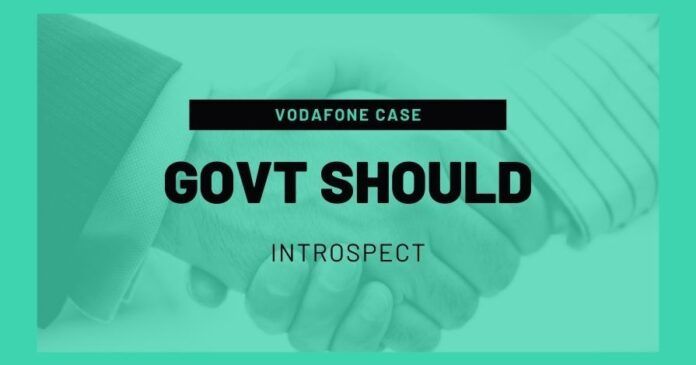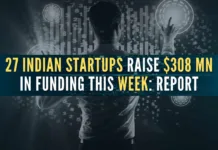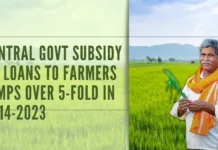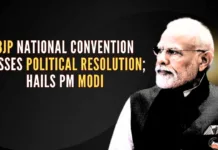
In a unanimous decision, wherein the arbitrator appointed by the Government of India also consented with the other two arbitrators, the Permanent Court of Arbitration at The Hague on 25th September ruled that India’s retrospective demand of Rs 22,100 crores as capital gains and withholding tax imposed on the British telecom company for a 2007 deal was “in breach of the guarantee of fair and equitable treatment.”
In what is an interesting development, the court asked India not to pursue the tax demand any more against Vodafone Group. Curiously, the Vodafone case has had a series of twists and turns with multiple Finance Ministers playing a decisive role leading to the present order.
Facts of the case
In May 2007, Vodafone bought a 67% stake in Hutchison Whampoa for $11 billion. This included the mobile telephony business and other assets of Hutchison in India. The Income Tax Department slapped a demand of Rs 7,990 crore in the same year in capital gains and withholding tax from Vodafone, detailing that the company should have deducted the tax at source before making a payment to Hutchison.
The very same year, the then Finance Minister, Pranab Mukherjee, nullified the order of the Supreme Court by amending the Income Tax law through the Finance Act 2012, thereby giving the Income Tax Department the power to retrospectively tax such deals.
After losing the case in the Bombay High Court, Vodafone challenged the income tax demand in the Supreme Court of India. The apex court in 2012, in what was considered to be a landmark judgment, ruled in favour of Vodafone Group, stating that the interpretation of the Income Tax department was incorrect and that they did not have to pay any taxes for the stake purchase. The main contention of the Supreme Court was that the Income Tax Act, as it stood then, did not have the provisions to tax the particular purchase, and hence, in the absence of an enabling provision, the question of taxation did not arise.
Pranab Mukherjee – Retrospective Amendment
The very same year, the then Finance Minister, Pranab Mukherjee, nullified the order of the Supreme Court by amending the Income Tax law through the Finance Act 2012, thereby giving the Income Tax Department the power to retrospectively tax such deals. The Act was passed by Parliament that very year in what came to be infamously known as the Vodafone retrospective taxation matter. This attracted international attention with investor sentiment being badly affected as the retrospective amendment had a serious and direct impact on very many cases beyond Vodafone.
International Arbitration and Arun Jaitley
Arun Jaitley who became Finance Minister in May 2014 had recused himself from dealing with the Vodafone case and delegated the matter to his then deputy, Minister of State, Nirmala Sitharaman, as he had previously represented Vodafone and linked companies in the related tax matters in his capacity as an advocate.
As Jaitley had recused himself and Vodafone matter was a case of interplay between many Ministries, he had even recorded on file that in the event of a dispute between different Ministries or Departments, the matter is referred to the Prime Minister for the final decision.
It appears that if the Government accepts the award of the tribunal, it may have to shell out around Rs. 85 crores to Vodafone.
However, the arbitration into which India decided to participate in the first instance, appears to be on an erroneous grounding. The Bilateral Investment Promotion Agreements (BIPA) signed by India with certain countries, according to experts does not include the provisioning for tax disputes and hence, by accepting to participate in the Vodafone arbitration – the first of its kind – India allowed the opening of the can of worms thereby voluntarily letting itself be dragged into other such cases also.
As reported by PGurus previously, the controversies kept flowing in[1]. It appeared that owing to an on-going tussle between Arun Jaitley and the then Finance Secretary Hasmukh Adhia on this issue, Prime Minister Narendra Modi was kept in the dark and there were multiple flip-flops in the official position of the Government of India. At one point India mysteriously agreed for Vodafone’s demand to change the arbitration from Netherlands to London!.
From choosing the lawyer to letting the nation be dragged into the London arbitration, the Government constantly and consistently played along with Vodafone in what appeared to be a case of bench hopping/ shopping. It is still uncertain as to why the Finance Ministry allowed itself to become a party to the second arbitration in 2017… On the very same matter – under India – UK bilateral arrangements, when the first arbitration was still underway.
While this confused stand of the Finance Ministry was apparently evident, curiously, the then Finance Minister in a Business Summit organized in 2018 said that “I always felt Vodafone tax decision was an erroneous decision…. This Government will not be taking any retrospective decision[2].”
Jaitley’s role, despite the recusal, did not end there. In May 2017, as already reported in PGurus[1], in what is a very dubious move, a note was issued by the Finance Minister to the Principal Secretary to the Prime Minister stating that as per the note given by “a former colleague from the legal fraternity,” the Government was not being represented adequately before the arbitrations.
The opinion of the Income Tax Department – contrary to the comments of the former colleague from the legal fraternity – which anticipated abuse of the process, was also ignored by the Department of Revenue and the Prime Minister’s Office was not in the loop on this most important tax dispute which had international ramifications for India. Further, it also appeared that the advocate/counsels representing India were chosen at the behest of the then Finance Minister[3].
The Finance Ministry, according to a press release, is studying all the aspects of the award and is in consultation with the legal counsels for charting the future course of action. It appears that if the Government accepts the award of the tribunal, it may have to shell out around Rs. 85 crores to Vodafone.
The larger questions still remain – will this become a precedent for tax disputes becoming a part of international arbitrations under investment agreements? Will India accepting this order also mean an implicit acceptance of tax matters being covered under the bilateral investment agreements? What is the direct consequence of this order in the on-going Cairn arbitration proceedings? And will there be a white paper on this issue and the larger question of retrospective amendments in taxation and international arbitrations given that billions of dollars of public money are at stake?
References:
[1] Violating Conflict of interest Jaitley intervenes in Vodafone case – Jun 19, 2017, PGurus.com
[2] Vodafone tax was a very bad idea, says Arun Jaitley at ET GBS – Feb 24, 2018, Economic Times
[3] Was Modi kept in the dark about moves in the Vodafone tax battle? – Apr 11, 2018, Asia Times
- Subramanian Swamy approaches Supreme Court on Govt’s modification of 2G Scam Judgment to avoid auction of Satellite Spectrum - April 23, 2024
- Defence Minister Rajnath Singh visits Siachen. Reviews military preparedness - April 22, 2024
- Amit Shah’s shares in the Stock Market almost doubled in the past five years - April 21, 2024











[…] खबर को अंग्रेजी में यहाँ […]
Chidbambaram-Pranab-Arun Jaitley regimes in Finance Ministry and how Vodafone had last laugh when their Advocate Jaitley became Finance Minister. Income Tax collapsed after Jaitley opted for International Arbitration
[…] Read More […]
Is india such a cash rich country that they can pay legal costs of 85 crores ?
I think the costs should be recovered from ministers and bureacrats who put incorrect advise on paper and went to resolve a dispute which was irrational
If they were so confident how amd why did they lose ? Obviously the arguments they were asking the legal team to prepare were weak !
Good point
If one wins the Party gets the credit
If one looses the Govt gets the bill
Lawyers abound to make use of the situation.
Tell me – What is the conviction rate of the CBI ? Maybe less than 10%.
More like the Coverup Bureau of Investigation.
Can someone also list out the legal costs paid to lawyers of the CBI /ED / NCB year wise.
The infrastructure is used clearly for party ends and at Govt costs. By some more so as we know now.